My name is William Gordon and I was born in Glasgow, Scotland on the 3 of November 1918. At the outbreak of the second world war, I was already a member of the Territorial Army and serving as a gunner with the Royal Artillery.
I was notified by telegram to report to our depot at Cathcart Drill Hall in Glasgow and then spent two years in the south of England with an Ack-Ack unit in Linconshire. (Bill enlisted with Royal Artillery TA 17 February 1939.)
In 1942 I saw a regimental notice about a new parachute battalion being formed and that volunteers were sought. I requested a transfer from my CO, who tried to convince me to remain and even turned down the offer of a stripe as the lure of the new regiment was too great.
The medical was reputedly very strict and I was dreading this because we had been told that having false teeth would result in you being RTU’D. Unfortunately, I had lost some teeth as a result of a cycling accident (being a cycling fanatic and member of the Glasgow Nightingale Cycling Club).
I was, apart from my teeth, in excellent physical condition and with much trepidation took my turn at entering the doctor’s room. This man simply looked up from his notes and after a few seconds of observing me said “Well, What do you do to keep yourself in such excellent condition?”. “Cycling Sir” and the Doctor simply stamped my sheet without laying a hand on me. I was overjoyed.
As far as I was aware, I was the only Para with a part set of dentures and the best of it was that I used to put them in a “Balken Subrana” cigarette tin in my smock before embarkation, then put them back in my mouth on the way down! I still laugh about this.
(Bill took part on Parachute Training course at RAF Ringway. This Course ran from 27 July to 3 August 1942. It included 2 jumps from balloon and 5 from aircraft.)
After completing my basic training I served in Algeria, Tunisia, Sicily, Italy and eventually Holland where I was captured.
During the invasion of Algeria, our invasion force was fired upon by our own navy, who mistook us for the enemy. Onboard Major Alistair Person’s aircraft, the American Pilot announced that due to the fire he was turning back at which Major Pearson drew his pistol, cocked it and put it to the pilot’s head informing him that if he turned the plane he would shoot him and that a trained Para pilot with us would take over. We jumped as scheduled.
ARNHEM SEPT 1944
I jumped onto the DZ on Sunday 17th September at approx 2pm. We rallied to smoke canisters, using different colours for the three battalions which were
1st Battalion Green
2nd Battalion Yellow
3rd Battalion Red The colours have since changed.
After one hour we moved off towards Wolfheze and down a side road to the main road, Utrechtseweg towards Arnhem. We had two scouts out in front ( one being my good friend Pte Bill Collard) when suddenly out of a side road came a German staff car carrying as it turned out, General Kussin and three soldiers. I think they were his driver, interpreter and batman. Bill and the other Para, Pte Bennet, killed them all and there is a much used photograph of the unfortunate General laying out the door of his vehicle. Neither Bill or the rest of us left the general like that, he was still in the car when we passed by.
Some time later we reached the Hartenstien Hotel and as it was getting dark we were ordered to rest until daybreak. We then made our way to the St Elizabeth Hospital and had to take cover after coming under heavy sustained fire from down near the main square of Arnhem town, near the railway and bus station and from across the river at the brickworks.
Throughout the following days we were reduced to playing hide and seek with a vastly superior armed enemy through the many alleys and houses. All the time the poor Dutch people helped us whenever they could.
On the Monday, we were hiding in a house next to the hospital and General Urqhart and his staff officers were in the house next door. Unfortunately whilst we were taking a rest our CO Major A.P.H. Waddy (we called him Cowboy Waddy because he wore a Colt 45 on each hip!) went into the garden and was killed by a mortar round landing close beside him. I believe that General Urqhart wrote in his memoirs that Major Waddy had been killed by blast, but we looked at the major and found a small trickle of blood coming from a shrapnel wound in his forehead. We had all held Major Waddy in the highest regard and his loss was a severe blow.
Back in the house, whilst holed up, a German mobile gun came down the street and stopped directly outside our front door! We saw the SS make their tea and heard them chatting away to each other totally unaware that we were only a few feet away. We just tried to stay still and not make our presence known. The tank moved off the next morning to our great relief!
We were then ordered to throw smoke grenades to allow General Urqhart and his officers to escape then we were to follow immediately, which we did making our way into Arnhem west and near the civilian prison where there was very heavy fighting with the Germans forming a blocking line and cutting us off from getting back into Osterbeek.
By this time we were very low on rations and ammo, therefore hiding during daylight and on the Wednesday night we moved down to the river but were unable to find any means to cross the river to safety and had to return to shelter in a house near the Glass House or Pavilion as the Dutch called it. We had been spotted.
An enemy tank came down the road and stopped outside our house. The tank had a loud speaker fixed on it and a voice in Oxford English announced “ Gentlemen of the First Airborne Division, you have fought a brave and sustained battle with great courage against vastly superior numbers, however the situation is now hopeless, think of your wives and sweethearts! Surrender and you will be treated as honourable prisoners of war”
After only a few seconds some idiot down stairs fired off a burst from a bren gun at the tank. Silence! Then slowly the tank turret whinned into life turning to point at the house, the barrel elevated and BANG! They had fired a solid shot, the result I can only describe as being like a Tom and Gerry cartoon where the round makes a whole on the front wall and makes the same whole all the way through every internal wall in the house, before exiting out the rear wall.
We all knew this was the end and quickly threw our rifle bolts and fighting knives into the river. I think there were about ten of us in the house and I knew none of the other Paras having become separated from my mates in the fighting.
We were all very nervous about surrendering to the SS having fought them in North Africa and were well acquainted with their conduct in war, but that is another story.
As I walked out of the house with my hands above my head, an SS soldier struck me in the face with his rifle butt saying “English Swine.”
The day I surrendered was one of the saddest days in my life. I had taken many prisoners and now found myself at the mercy of others.
For me and my fellow soldiers, the fighting was over and somewhere I had never heard of called Fallingbostel and Stallag XI B awaited us.
FALLINGBOSTEL
After our capture we were searched and every item of military significance was taken and also our emergency rations including chocolate, soap, etc. They marched us up to Zutphen, then onto Enschede, sleeping in a huge barn on the way. We were then put into cattle trucks and upon arriving at Frankfurt am Main, I and another three Paras were really shocked to hear our names and numbers being called to get off the train!
We were taken to a Dulag Luft at Oberursel where we were interrogated on and off for two days. The interrogation was very cordial and friendly with a German officer asking me “What is your name?” “Bill, Sir”, I replied. “Which battalion are you in Bill?” “I can’t tell you that sir”. Take your smock off Bill, Ah yes! Your in the third battalion” as he looked at the colour of my lanyard!
After that, we (4 of us) were taken to a civilian railway station under guard and whilst waiting on the platform an elderly lady approached us and inspecting us for several seconds proceeded to get her umbrella out and beat the daylights out of the nearest para shouting TERROR FLIEGER! We laughed later on. We boarded the train and were put in a locked compartment with our guard.
Upon arrival at Fallingbostel station we were marched up to camp IIB, searched again and taken to the British compound and left to find a bunk if lucky enough!
Initially the camp discipline was very poor, and it was here that I first came into close contact with RSM JC Lord (or Jesus Christ) as he was known to the men.I had the highest regard for RSM Lord who was a soldier from his head to the tip of his toes and someone I held in the highest regard.
We were ordered not to attempt to escape given the advancing allies and were also put off this idea by the many posters the Germans put up informing us that there were many “Forbidden Areas” in Germany and if caught in them we would be shot! The only problem was they did not state where these areas were! Which was obviously the point.
RSM Lord quickly let it be known that we would all conduct ourselves like the professional soldiers we were, whither prisoners or not. I was asked by him to work in the German Abwehr office along with Lance Corporal Lowe, ( I was the company clerk in 3 Para) registering all British Pow’s. This turned out to be a very privileged position as every day I was allowed to leave the prisoner compound and go to work in the Abwehr office.
This also allowed me the opportunity to barter with the guards for the boys, and I cut open the lining in my smock tail and into which went potatoes and other items, all with the help of the guards, who would walk me back at night directly through the gates to prevent me from being searched.
All the German guards and everybody else new the war was ending and the guards would say to me “Remember Bill, we have been good to you!” Being good to me even involved taking myself and LCp Lowe to the village pub, although we were told to sit at the rear door where we were brought a bier! I swear to God its true. The guard who was particularly friendly with me was U/O Paul Corindorpfer and we would tell each other about our families and homes showing each other photographs of our loved ones.
Another guard was the cook, Cooper. I’m not sure if that’s the correct spelling.
Life was hard for everyone, the lice were terrible and a continuous problem. Food was very sparse and this was when I was first introduced to horsemeat! However bad our situation, the Russian civilian slave labour’s conditions were much worse and the Germans treated them like animals, even we thought they were all crazy, which was probably due to the fact that they were starving. Once a fight broke out in the Russian compound and the guards sent in two Alsatians. They never came back! Dog Stew!
On another occasion the Germans noticed a really bad smell coming from a Russian Barrack, apparently the Russian’s had been secretly burying their dead below the floor, to keep getting the dead’s food allowance!
In April we started to hear artillery which grew closer and closer. One morning I got up and made my way to the Abwehr office as usual. There were no Germans to be seen! The office was empty and the Germans had left in the night although the elderly sentries were still on the gate.
I heard the noise of a tank coming up the road to the camp and hid in some trees, becoming overjoyed when I saw it was one of OURS! It was a small ferret scout car type vehicle. I went out into the middle of the road and waved him down. The driver was very surprised to see me, he was really dirty! He asked me how I got out and where the main gates were and I took him there.
RSM Lord detailed a number of NCOs to keep everyone in camp, and especially in the Russian compound, although LCp Lowe and I were still allowed out.
The next day we bumped into a French soldier who was carrying a number of pistols and holsters in his arms. We “told him” he was giving us one each, which he duly did. We got a Walther each and some ammo.
RSM Lord seemed to disappear after that, I do not know if he was taken back to the UK or what.
We returned to the UK about the 21st of April by plane, landing at an aerodrome near Oxford and were posted back to Hardwick depot. After three months home leave, I spent three months of service at AAC (Army Air corps Records Office) Drillhall, East Claremont St, Edinburgh making a nominal roll of dead Paras, which I took back to Hardwick depot.
I finished my service on 12th January 1946.(On his release papers it was noted that Bill's conduct was "Exemplary. Clean & efficient & well thought of by his comrades")
I am and have always been proud to be a member of THE first Parachute Brigade and have never rediscovered the camaraderie that I once had in 3 Para. One of my biggest regrets is that we let the Dutch people down.
My links with Arnhem continue to this day and I have been fortunate to be “adopted” by a Dutch family who have been allowing me to stay with them during the various Arnhem anniversaries. Thank you Ena and Arie.
I am the Arnhem Veteran Association’s representative, for Scotland and N.Ireland.
PS
In 1984, as a surprise for me, my son traced my war time mate and Para, Bill Collard.
We subsequently spent many hours on the phone to each other and met up again at several reunions. It transpired that Bill was also in Fallingbostel and I never knew. He had been shot in the leg in Arnhem, (after his webbing had caught on a railing preventing him from getting away from the enemy) and was in the Lazerette (hospital wing?). We never knew each of us were there! Unfortunately Bill passed away in 2004.
2010
My father and hero William Gordon passed away on the 7th of February 2010 from cancer. He was given a military funeral at my and my mother’s request and the Parachute Regiment Association did him proud on the day.
I am greatly sustained by the words of a mutual friend, ex 3 Para and SAS soldier who said to me afterwards:
“Your father lived through extraordinary times and extraordinary times call for extraordinary people. Your father was one of them.”
Whoa Mohammad! (Battle cry of 3 Para in North Africa)
Stewart Y Gordon
Kirkintilloch
Scotland
With additional information supplied by ParaData Manager
Created with information and images kindly supplied by Stewart Gordon. Biography written by the late William Gordon.
Read More
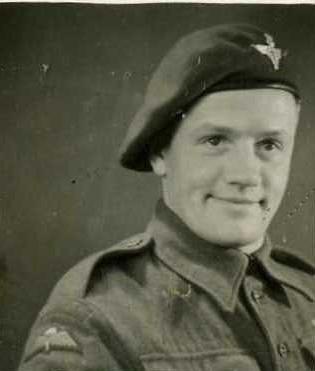
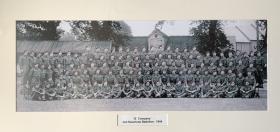
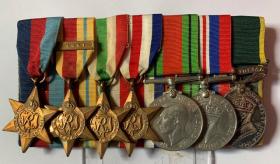
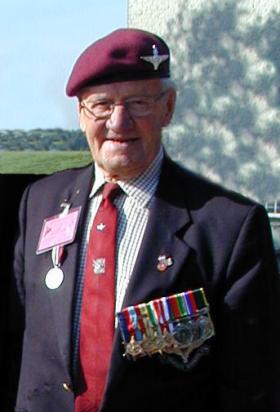
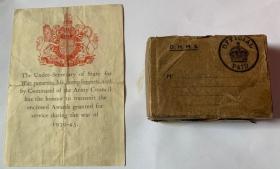
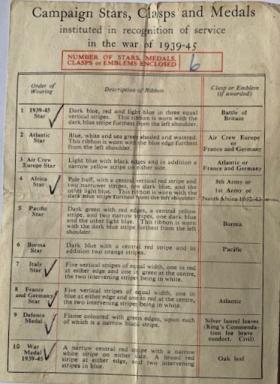
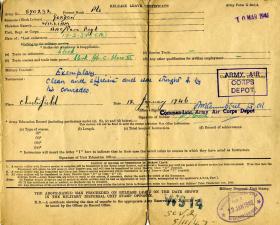
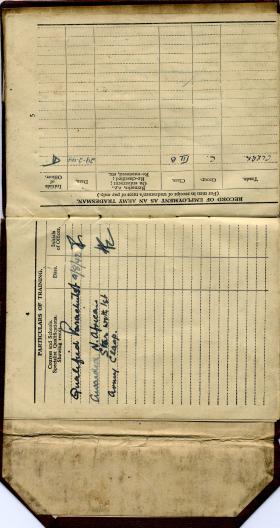
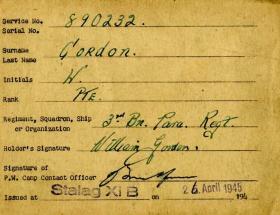
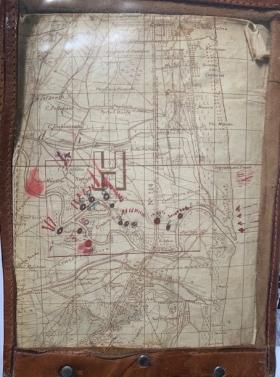
Latest Comments
There are currently no comments for this content.
Add Comment
In order to add comments you must be registered with ParaData.
If you are currently a ParaData member please login.
If you are not currently a ParaData member but wish to get involved please register.